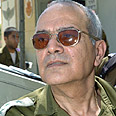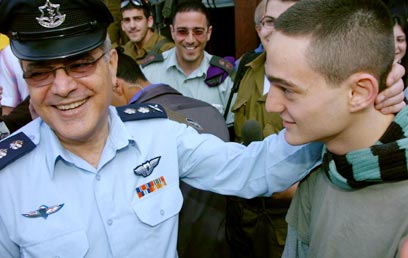
Halutz: No confrontation with Hamas in near future
(VIDEO) In special Ynet interview ahead of Independence Day, IDF chief of staff says group constitutes threat as long as it doesn’t change its stance; referring to Iranian threat, Halutz says, 'we should not carry out acts that are not in the right place'
VIDEO - A heavy moustache is hovering these days over the Israel Defense Forces and the security establishment. Its owner, Defense Minister-designate Amir Peretz, is a mystery for military leaders.
How will the man who's replacing generals for the first time behave? Will he defend the army's financial demands or push for cuts in the defense budget?
In an interview on the eve of Independence Day, IDF Chief of Staff Lieutenant General Dan Halutz told Ynet he does not believe Peretz will storm the office that Shaul Mofaz is leaving.
As if terror, the Iranian threat and Qassam fire were not enough, Halutz also had to deal with a scandal involving IAF soldiers suspected of having molested a 13-year-old girl in their base.
Video: Yaron Brenner
Chief of Staff Dan Halutz, is discipline in the IDF becoming lax?
"It is not discipline in the banal sense when we speak about military discipline, and I don't think things are becoming lax. In the case of the Air Force, a number of events took place, the latest is suspicions that a teenage girl was raped by a number of soldiers and civilians. The case will be dealt with accordingly.
"A number of events took place within little time of one another but they do not signal a moral and ethical downfall in the army. It is not related to operational tension. Discipline is a central issue occupying a central post in our priorities and it is necessary to fix discipline for good because it is not obvious."
Soon you will have a new boss, Amir Peretz as defense minister. Do you doubt his lack of familiarity with the field?
"First of all I welcome him. I will never have something to doubt in a defense minister. I have no doubts and we can learn what we don't know. I was unfamiliar with a lot of things at first."
What will you tell him about the defense budget, for example, one of the most important issues?
"The whole truth. What I think of the defense budget, which is smaller than it should be."
Halutz knows further cuts to the defense budget are on the way. Even operations will dwindle and the military service will be reduced by 4 months.
"Of course this carries risks," Halutz said. "The risk is mainly quantitative, the number of soldiers we need to carry out our missions. Reducing the military service will take place in April 2007.I believe that if the security situation is not favorable we will bring the issue for consideration by those responsible."
As for the latest terror attacks in Sinai, Halutz said the attacks do not signal an escalation in the threat of international Jihad to Israel.
"If you place all the attacks attributed to international Jihad on the map, you can see that Israel is in the middle. Does this constitute a dramatic change in terror's relation to Israel? I believe there is no chance. All these threats were and will be in the future," he said.
Is Hamas still a threat even after winning the election and taking over the Palestinian Authority?
"Hamas is a threat as long as it hasn't changed its stance. When Hamas carries out attacks, it will be dealt with like every other terror organization. It doesn't make a difference if a terrorist has a Hamas membership card in his pocket. He has no immunity, we will turn him over. We see no confrontation with Hamas in the near future, but if Hamas gets involved in attacks we will have to take action against them, and this will cause escalation."

'Almost sure our situation will be better.' Halutz at IDF Induction Center (Photo: IDF Spokesperson's Office)
Halutz knows that the IDF is being criticized for harming Palestinian civilians during operations against terror elements, especially in the Gaza Strip.
"We need to put things in order," he said. "He who finds refuge amongst civilians is a terrorist. We look for terrorists, not civilians. I wish we were able to avoid harming civilians. We deeply regret harming civilians but we cannot stop taking action against terrorists, and the best advice I can give to the Palestinians is to spew the terrorists from among their midst and avoid being near them."
We recently received additional proof that the Iranians are continuing in full speed towards a nuclear ability. Now they are talking about 2009. Until when will we sit and wait for the international community to act?
"We first of all let the international community find what it wants to find, I think that is appropriate. We are part of the international community, we are not the sheriff of the region here. We should not get carried away, and speed ourselves up and carry out acts that are not in the right place, not the right time, before others try and do what has to be done."
What is Israel's deadline from a military point of view?
"Why talk about deadlines? We are following what is happening, we are monitoring and looking, and the term deadline is not good because it establishes a line that once crossed one must act. This obligation is not on our shoulders at this time, because the world understands that this is its task and I suggest we should not jump the gun."
With that, alongside the moderate declarations, the chief of staff believes that the Iranian threat should be treated with the utmost seriousness. In a message released on Memorial Day for Israel's fallen soldiers, he said: "Israel must not ignore statements by the Iranian president who does not recognize our right to live here as an independent state."
Nine months after the Gaza disengagement, can you say what this maneuver has done to the Palestinian terrorist organizations?
"There is no one truth here. I look at the disengagement and ask whether it strengthened the Israeli stance. In pure military terms, no soldier or civilian has been killed in Gaza. One hundred terrorists were killed and Qassams have fallen, these are the facts. Regarding the Qassams, we are acting and we will reach a solution. I'm not putting a schedule on it. I would be glad to say that on this date or other it will happen, but we do what we can in order to deal with the rockets."
Have you started preparing the convergence program?
"There is no convergence program as a program I know. There could be one that I don't know of. There certainly has been no order to the army to prepare a concrete and specific plan. We heard like the rest of the Israeli people the declaration of the prime minister regarding political ideas, and when a plan is received – we'll prepare for it."
On the next Independence Day, when Israel will be 59 years old, will our situation be better or worse?
"In terms of what we are responsible for and what we can influence, I'm almost sure our situation will be better. In all that is connected with threats that the vicinity presents to us, I am not convinced that the situation will be better, because when I look at long-term processes I don't exclude the possibility that some of the threats will increase, especially terror threats, including of course the Iranian program.
"With that, I am relatively optimistic over the reality in which we live regarding our ability to maintain a necessary level of security, and also to progress in al the other fields that the state wants to advance in."
Ali Waked contributed to the report










